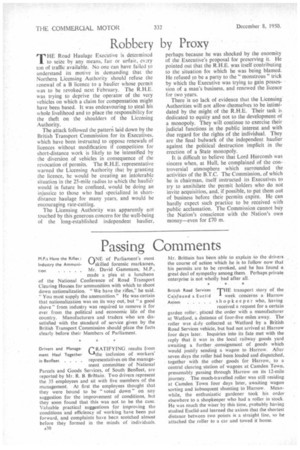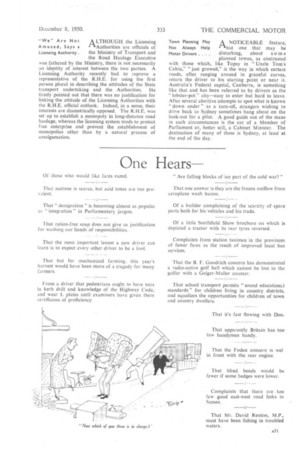Passing Comments
Page 32

Page 33

If you've noticed an error in this article please click here to report it so we can fix it.
M.P.s Have the Rifles : nNE of Parliament's most Industry the Ammuni'-'skilled forensic marksmen, tion Mr. David Gammans,
made a plea at a luncheon of the National Conference of Road Transport Clearing Houses for ammunition with which to shoot down nationalization. "We have the rifles," he said. "You must supply the ammunition." He was certain that nationalization was on its way out, but "a good shove" from industry was required to remove it for ever from the political and economic life of the country. Manufacturers and traders who are dissatisfied with the standard of service given by the British Transport Commission should place the facts clearly before their Members of Parliament.
Drivers and Manager_RATIFYING results from ment Haul Together •-ilthe inclusion of workers' in Benfleet . . representatives on the manage
ment committee of National Parcels and Goods Services, of South Benfleet, are reported by Mr. R. B. Brittain. Two drivers represent the 35 employees and sit with five members of the management. At first the employees thought that they were bound to be "voted down" on any suggestion for the improvement of conditions, but they soon found that this was not to be the case. Valuable practical suggestions for improving the conditions and efficiency of working have been put forward, and complaints hare been scotched almost before they formed in the minds of individuals.
430
Mr. Brittain has been able to explain to the drivels the course of action which he is to follow now that his permits are to be revoked, and he has found a great deal of sympathy among them. Perhaps private enterprise is not wholly bad after all.
British Road Services THE transport story of the Confound a Euclid I week concerns a Harrow Axiom shopkeeper who, having
received a request for a certain garden roller, placed the order with a manufacturer at Watford, a distance of four-five miles away. The roller was ddly collected at Watford by a British Road Services vehicle, but had not arrived at Harrow four days later. Inquiries into its fate met with the reply that it was in the local railway goods yard awaiting a further consignment of goods which would justify sending a wagon to Harrow. After seven days the roller had been loaded and dispatched, together with the other goods for Harrow, to a central clearing station of wagons at Camden Town, presumably passing through Harrow on its 12-mile journey. The much-travelled roller was still residing at Camden Town four days later, awaiting wagon sorting and subsequent shunting to Harrow. Meanwhile, the enthusiastic gardener took his order elsewhere to a shopkeeper who had a roller in stock. He was much the wiser by this time, probably having studied Euclid.and learned the axiom that the shortest distance between two points is a straight line, so he attached the roller to a car and towed it home.
"We" Are Not A'OUGH the Licensing
Amused, Says a Authorities are officials of Licensing Authority . the Ministry of Transport and the Road Haulage Executive was fathered by the Ministry, there is not necessarily an identity of interest between the two parties. A Licensing Authority recently had to reprove a representative of the R.H.E. for using the first person plural in describing the attitudes of the State transport undertaking and the Authorities. He firmly pointed out that there was no justification for linking the attitude of the Licensing Authorities with the R.H.E. official outlook. Indeed, in a sense, their interests are diametrically opposed. The R.H.E. was set up to establish a monopoly in long-distance road haulage, whereas the licensing system tends to protect free enterprise and prevent the establishment of monopolies other than by a natural process of amalgamation.
Town Planning May A NOTICEABLE fea tut e,
Not Always Help imbut one that may be Motor Drivers . . . • disturbing, about some planned towns, as contrasted with those which, like Topsy in "Uncle Tom's Cabin," "just growed," is the way in which certain roads, after ranging around in graceful curves, return the driver to his starting point or near it. Australia's Federal capital, Canberra, is something like that and has been referred to by drivers as the "lobster-pot" city—easy to enter but hard to leave. After several abortive attempts to spot what is known "down under" as a turn-off, strangers wishing to drive back to Sydney sometimes hang about on the look-out for a pilot. A good guide out of the maze in such circumstances is the car of a Member of Parliament or, better still, a Cabinet Minister. The destination of many of these is Sydney, at least at the end of the day.




























































































